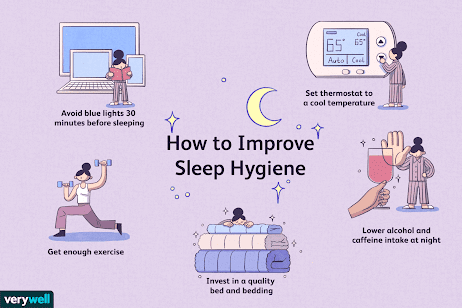How to Improve Your Sleep Quality for Better Health
How to Improve Your Sleep Quality for Better Health
Sleep is an essential part of maintaining good health. When you get quality sleep, your body can function properly, your mind can recharge, and your mood can improve. Unfortunately, many people struggle to get a good night's sleep. Whether it is due to stress, anxiety or other factors, lack of sleep can adversely affect our health. This article will explore some important tips on how to improve sleep for a healthy life.
1- Stick to a sleep schedule
Waking up at the same time every day, and going to bed at the same time, even on the last weekend, will help you improve your body's inner life and improve the quality of your sleep. Establish a sleep schedule that works for you and stick to it.
2- Create a sleep-inducing environment
Your bedroom environment should be comfortable and relaxing, which promotes better sleep. Keep the temperature optimal, invest in a comfortable bed, and make sure your room is as dark and quiet as possible. You may also consider investing in blackout curtains, earplugs or a white noise machine.
3- Avoid stimulants before going to bed
Caffeine, nicotine and alcohol can all disrupt sleep. Stop using these things for at least a few hours before going to bed. Additionally, avoid large meals, spicy foods, and excessive fluids before bed.
4- Develop a relaxing bedtime routine
Establishing a relaxing bedtime routine can make a big difference in your life, and it's your signal that it's time to wind down and get ready for bed. Consider taking a warm bath, practising yoga or meditation, or reading a book before bed. Avoid engaging in activities, such as working or watching TV, an hour or so before bedtime.
5- Regular exercise
Regular exercise can help improve the quality of your sleep. Make a routine of at least 30 minutes of physical activity most days of the week. Just make sure to avoid exercising too close to bedtime, as this can have the opposite effect and make it harder to fall asleep.
6- Limit screen time
Blue light emitted by electronic devices like smartphones, tablets and computers can interfere with your body's production of melatonin, a hormone that regulates sleep. Limit your screen time, especially the hour or so before bedtime. Consider turning off all electronic devices or using a blue light filter.
7- Identify the underlying sleep disorder.
If you're constantly struggling with sleep, it's possible that lack of sleep is to blame in the first place. Sleep disorders such as insomnia, restless legs syndrome, and insomnia can all affect the quality of your sleep. If you suspect you may have a sleep disorder, talk to your doctor.
8- Focus on natural sleep habits
Many natural sleep aids can help you sleep better. Some popular options include valerian root, chamomile tea, and lavender essential oil. Be sure to talk to your doctor before trying any new prescription.
9- Seek treatment for anxiety and depression
Both anxiety and depression can disrupt sleep. If you are struggling with one of these conditions, seek treatment from a mental health professional. Addressing the underlying cause of your sleep problems can help improve your sleep.
10- Get more sunlight.
Sunlight can help regulate your body's production of melatonin and improve your sleep quality. Try to spend at least 30 minutes outside every day, especially in the morning.





.jpg)








Comments
Post a Comment